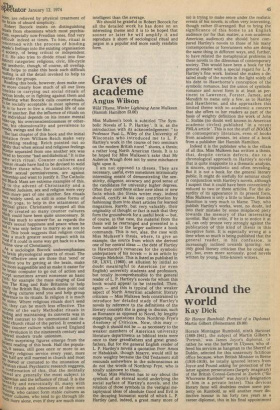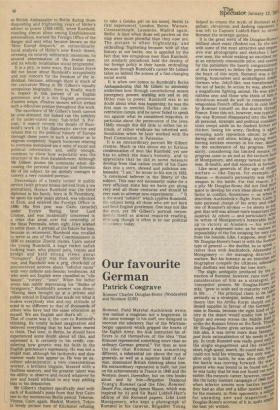Around the world
Kay Dick
Sir Horace Rumbold: Porkait of a Diplomat Martin Gilbert (Heinemann £8.00) Horace Montague Rumbold, ninth Baronet (1869-1941), the subject of Martin Gilbert's 'Portrait,' was James Joyce's diplomat, or rather he was the barber in Ulysses, who offered his services as hangman to the Sherrif of Dublin, selected for this unsavoury fictitious office because, when British Minister in Berne (1916-1919), he totally ignored letters from Joyce and Pound asking for protection of the latter against persecutions (largely imaginary) of the British Consul-General in Zurich ("Sir Whorearse Rumbole" was Joyce's designation of him in a private letter). This devious literary fame will doubtless endow some posterity on Rumbold, as will another more distinctive honour in his forty two years as a career diplomat, this in his final appointment
as British Ambassador to Berlin during those disquieting and frightening years of Hitler's advent to power (1928-1933), when Rumbold, standing almost alone among Establishment personalities, warned the Foreign Office of the danger and sent what became known as the 'Mein Kampf despatch,' an extraordinarily lucid analysis of Hitler's new Reich thesis, stressing its entirely militaristic intentions, its avowed extermination of the Jewish race, and its wholly totalitarian social programme.
It is a pity, in some ways, that James Joyce did not know about Rumbold's scrupulosity and real concern for the freedom of the individual, because, although there is much of the caricature Blimp in Mr Gilbert's equally scrupulous biography, there is, finally, much to respect in this portrait of an English gentleman, and it is this English _gentleman d'autres temps, d'autres moeurs which strikes such a ridiculous posture throughout this work.
The excellence of Mr Gilbert's book cannot be over-stressed, nor indeed can the subtlety of his under-stated irony. Sub-titled 'A Portrait,' it mainly records the details of Rumbold's work in the diplomatic service and relates this to the political history of Europe through these years in such a manner as to engross completely. Superb footnotes relating to everyone mentioned are a mine of social and political information, and, oddly enough, combine. to show how nepotistic was the structure of the then Establishment. Although Mr Gilbert prunes his comments when discussing the personal character and domestic life of his subject, he yet skilfully manages to convey a very rounded portrait.
Descendant of a family versed in public service (with private means derived from a tea plantation), Horace Rumbold was the third diplomat in his family, born in St Petersburg, he spent his early years abroad, was educated at Eton, and entered the Foreign Office in 1890. His first post was Cairo (attach6), under Evelyn Baring, later Lord Cromer, and was incidentally concerned in a crisis that arose over the ownership of the Sinai Peninsula, when eight Jews wished to settle there. A portent of the future for him, because in retirement, Rumbold was recalled to serve as one of the Peel Commissioners in 1936 to examine Zionist claims. Cairo suited the young Rumbold, a huge rather oafish looking man, who played polo, tennis and bridge and held strong views about "foreigners". Egypt was then under British rule, and Rumbold was a prig, chock-full of preconceived notions about "inferior races" with very definite anti-Semitic tendencies. All who were not English were classified as "oily beasts", "rotters", "jews". When his father wrote him mildly deprecating his "dislike of foreigners," Rumbold's answer was direct: "Having been brought up at a private and public school in England has made me what it makes everybody else and my attitude of mind is no different to that of thousands of others who have had the same education as myself. We are English and that's all. . . . " That of course was it, the core to Rumbold's thinking. He totally lacked imagination and believed everything that he had been reared to think. That later, in Berlin, he should have experienced some doubt about all this, and expressed it, is certainly to his credit, considering how genetic was his faith in the English gentleman's supremacy. He was not a stupid man, although his taciturnity and slow manner made him appear so. He was an excellent administrator, a very conscientious worker, a brilliant linguist, blessed with a faultless memory, and his greatest talent was his ability to observe and record whatever he saw and heard without in any way adding bias to his despatches.
Mr Gilbert's chapters specifically deal with each of Rumbold's posts from that first Cairo one to the momentous Berlin period: Teheran, Vienna, Cairo again, Madrid, Munich, Tokyo (a lovely picture here of Kitchener refusing to take a Geisha girl on his knee), Berlin (a first experience), London, Berne, Warsaw, Constantinople, Lausanne, Madrid again, Berlin. A time when those red patches on the map were more plentiful than they now are. The picture is often frightening, and enthralling: frightening because, with all that history at our backs, one is appalled by the fact that less scrupulous men than Rumbold, yet similarly prejudiced, held the destiny of our foreign policy in their hands, enthralling because through Rumbold's career Mr Gilbert takes us behind the scenes of a fast-changing social world.
It is when one comes to Rumbold's Berlin Ambassadorship that Mr Gilbert so admirably underlines how through constitutional means (emergency powers, enabling acts and so on) Hitler rose to power. Rumbold was in no doubt about what was happening: he was the first man to mention Dachau and the concentration camps, and he never failed to speak out against what he considered iniquities, in particular about the persecution of the Jews. Oddly enough this did little to soften his attitude, or rather eradicate his inherited antiSemiticism when he later worked with the Peel Commission in Palestine.
It is an extraordinary portrait Mr Gilbert creates. Much in this drove me to furious condemnation of men like Rumbold, yet one has to admit the man's honesty, and to appreciate that he did,in some measure develop from that callow youth of his Cairo days into a stern, shrewd and judicious ambassador. "I am," he wrote to his son in 1933, "a convinced believer in the liberty of the subject. This may not necessarily make for a very efficient state but we have got along very weil all these centuries and should be very rash to attempt new experiments...." It is the word "subject" which typifies Rumbold, the subject being all those who are not born and bred English gentlemen. One may not like the man, yet Mr Gilbert's portrait recommenrf. itself as almost required reading, sh.)c ;iing though it often is to our political 1,,cience today.



































 Previous page
Previous page